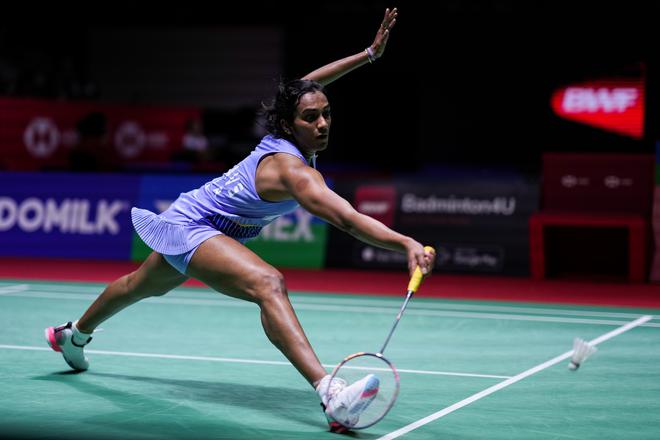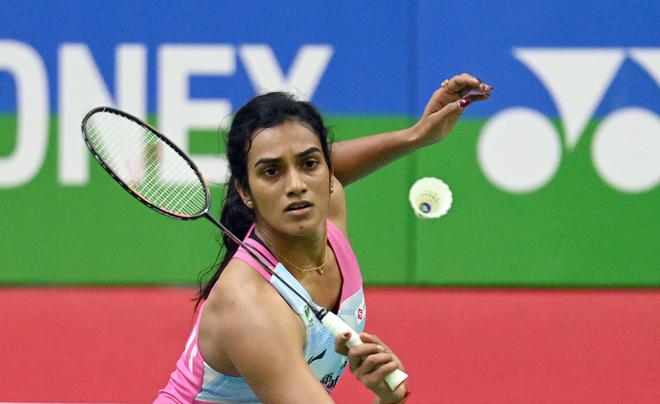

Nothing in sport is as ubiquitous as failure. A goalkeeper fluffing a regulation save, a wicketkeeper dropping a straightforward catch, a long-jumper touching the ground beyond the take-off board — every such public failure is a humiliating fall in the mud.
Failures are also star-blind and reputation-agnostic. Virat Kohli cannot go three years without scoring a Test hundred. Serena Williams should not lose four Grand Slam finals in a row. Tiger Woods must not be winless for over a decade at the golf Majors.
The latest to be scarred for failing to live up to the loftiest of expectations is P.V. Sindhu. One of India’s most decorated athletes, the badminton star is a two-time Olympic medallist, a world champion, Commonwealth Games gold and Asian Games silver medallist.
Worrying slump
But since winning the Commonwealth gold in Birmingham in August 2022, Sindhu has gone more than a year without climbing to the top of the podium. She has reached just one final in this period, at the Madrid Masters, where she lost 8-21, 8-21 to Indonesia’s Gregoria Tunjung, a player she had beaten in all of their previous meetings. Against a career singles win-loss record of 431-187 (70%), she has lost nearly every second match in 2023 (20-19, 51%).
At the All England Open, she didn’t win a rubber, and last month she lost her first encounter at the World Championships in Copenhagen, a dispiriting 14-21, 14-21 reverse to the former world champion from Japan, Nozomi Okuhara. It was the earliest she had lost at the Worlds since her first medal as an 18-year-old in Guangzhou 2013.
As the Hangzhou Asian Games beckons in the immediate term, and the 2024 Paris Olympics looms on the horizon, her worrisome form is the subject of a raging nationwide debate.
“She should first find her rhythm,” says Aparna Popat, a former National badminton champion and Arjuna awardee. “Ideally, if she was in form and things would have gone well, the Asian Games is a competition where she would have hoped to get a medal. And looking at her past, we know that she is very well capable.
“But right now, her priority should be to get her rhythm back. Considering it [Asian Games] is a longish tournament [Sept. 28 to Oct. 7], it may help her do that. To take one match at a time and see where she lands up at. The mindset shouldn’t be whether she can get a medal. But finding her rhythm should be a priority.”
Notoriously tough field
The Asian Games is, however, a notoriously tough tournament to find form in. Such is the strength of the competition that it can be termed the ‘World Championships minus Carolina Marin’. Among the world’s top 25 women’s singles players (rankings as on Sept. 19), only six are from outside Asia. India had long grappled to crack the code, with Syed Modi the only individual Asian Games medallist (bronze, 1982) until the successes of Sindhu (silver) and Saina Nehwal (bronze) at Jakarta 2018.
And Sindhu, ever since returning from a five-month injury layoff this January, hasn’t shown very many signs of regaining her form. The ankle stress fracture sustained during the gold medal run at 2022 CWG has hampered her on-court movement, with the resultant loss of speed, power and control accentuating her struggles.
In July, she fell to 17th in the world, her lowest ranking in over a decade. Though she is No. 15 now, slipping out of the world’s top 16 will deny her the protection that comes with being seeded at tournaments.
“She needs to get her speed back and the net play going,” says former National champion Vimal Kumar, who is the director and chief coach at the Bengaluru-based Prakash Padukone Badminton Academy (PPBA). “The injury was a tough phase and she is trying to come out of it and she may have to approach things in a different way.
“She has the height advantage [5’10”], but she needs to get those quick movements back, find her touch at the net, the variations to take the shuttle early, hitting it back and the tumble. She needs to use the half-smashes more judiciously.
“It is also not true that tall players can’t get to low shuttles. See how agile Viktor Axelsen is at 6’4”. You don’t need to teach her these things, but to regain the confidence to play those shots is not an easy task. A lot of things are against her.”
First step in the quest
The appointment of former All England champion Muhammad Hafiz Hashim as her new coach (since mid-July), following the exit of Park Tae-Sang who guided Sindhu to bronze at Tokyo 2020, is to be seen as the first step in this quest.
Since exiting from the Worlds nearly four weeks ago, she hasn’t played a tournament, choosing instead to train under the Malaysian by carving out a window in an infamously jam-packed calendar. Sindhu even visited the PPBA earlier this month for a few pearls of wisdom from the legendary Prakash Padukone.
While Hafiz has promised to help the 28-year-old “rediscover the winning touch”, Popat believes that at the end of the day it is all about how much Sindhu wants it. “We can look at who is playing and what her tactics are, but it would be better for her to look at herself,” Popat says.
“If we work backwards from the Olympics, we are running out of time. There is no question that it [success] will come. But can it happen in time? It depends on her motivation, what she wants to do and what her aspirations are. Can she win again? Of course she can. Does she want to do it, it is really up to her to decide.”
Vimal feels that the string of defeats may actually free her rather than be a burden. “There are no expectations and she is not the favourite for a medal,” he says. “The Japanese are there, so are the Chinese, and [World No. 1] An Se Young. But we can always be hopeful. Sindhu has the pedigree. Barring An Se, she has beaten all of them. If she can click, there is hope.”







